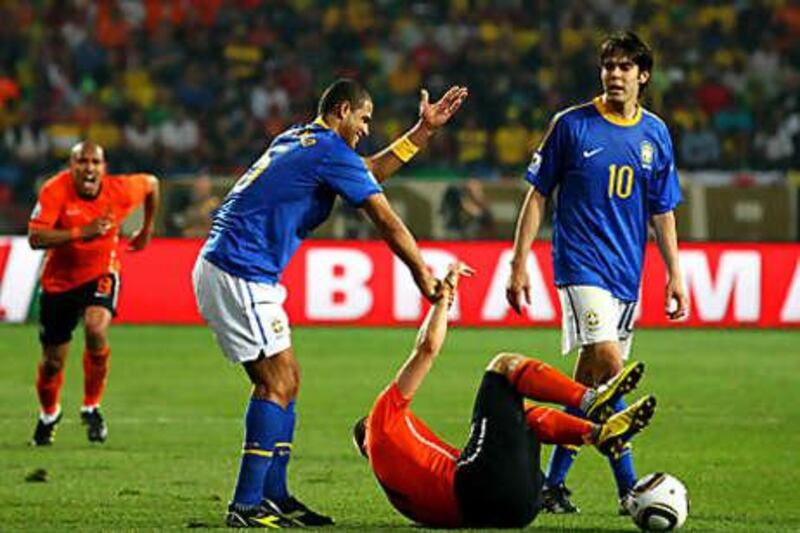The Bidone D'Oro is an unusual prize. It tends to be awarded to Brazilians and a list of distinguished recipients includes Rivaldo, Adriano and Felipe Melo. This, however, is no honour. A parody of the more prestigious Ballon D'Or, it is given to the player voted the worst in Serie A. It tends to be a vindictive choice of a big name, rather than a needless humbling of a substandard player in a relegation-threatened team. It translates, literally, as "the golden bin". And yesterday, its latest winner consigned Dunga's Brazil to the dustbin of history.
Felipe Melo's was the definition of a mixed game, beginning promisingly and ending diabolically. His was the guided, curled pass that, in a move of beautiful simplicity, allowed Robinho to give Brazil the lead inside 10 minutes. His was the unfortunate deflection, applied to Wesley Sneijder's cross, that allowed Holland to equalise, although the error was Julio Cesar's. His was the lax piece of marking on Sneijder when the Dutchman headed the winner.
Most damningly, his were the studs that were planted in Arjen Robben's thigh that drew a deserved red card in the 73rd minute. Starting stylishly and ending tempestuously, he epitomised Brazil. Michel Bastos had been fortunate to escape a sending-off for two hacks at Robben; he had to be replaced by Gilberto Melo. Within one, disastrous half, Dunga's twin gambles had backfired. While other managers emphasise the importance of form in selection, Dunga displayed consistency and loyalty. His chosen men have remained the same. Though Felipe Melo had an undistinguished year at Juventus and Bastos, whose defensive deficiencies were exposed by Robben, operates in midfield for Lyon and at left-back for Brazil.
Not Brazilian enough for the stylists in South America, abandoning pragmatism for purism required validation in the form of results. In a spectacular implosion, it was denied Dunga. The failings were not tactical as much as temperamental, but selection is controversial in a country that spawns skilled footballers in abundance. Consolation cannot be taken from an exit to kindred spirits. Holland are engaged in a similar debate between style and substance and were equally culpable in a niggly game. Brazil perpetuated the tactical fouling upon Robben, but Mark van Bommel was responsible for a series of fouls that somehow went unsanctioned.
Spiritual successors these Dutch may not be, but the class of 2010 are on course to emulate their predecessors from 1974 and 1978 by reaching a World Cup final. Theirs was a strange comeback, barely threatened when Brazil led yet somehow deserved for their stronger second half. Sneijder's magical 2010 continues and, when he views the bruises on his legs, Robben can at least reflect upon the realisation that his presence frightens opponents.
It was a match that can be assessed in two ways: for those who prefer to find fault with defences, Holland won because the Brazilian rearguard were guilty of two major mistakes to their one; for those who like to emphasise the efforts of attacking talents, it was because Sneijder and Robben exerted a greater influence after the interval, whereas Kaka faded. It has been a month to dent Kaka's reputation for excellence. His dismissal against Ivory Coast was a sign of uncharacteristic irritability; his failure to score means he joins Cristiano Ronaldo and Wayne Rooney on the list of supposed stars who underperformed.
When Robinho recaptured his joie de vivre and Luis Fabiano seemed intent on earning the Golden Boot, it mattered not. Football is a team game. Yet when a player dons the No 10 shirt, when he has the title of World Footballer of the Year on his CV and when potential rivals such as Ronaldinho are excluded from the squad, the expectations increase. Dunga backed Kaka, just as he backed Bastos and Felipe Melo. Unquestioning faith can win World Cups, but it can also lose them.
sports@thenational.ae






